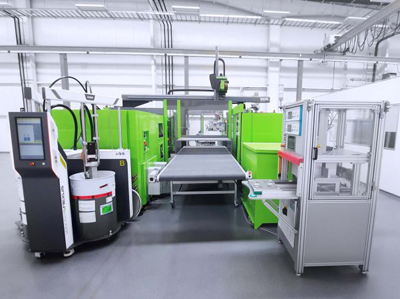Datwyler Mobility enhances material capabilities in China
Schattdorf, Switzerland – As the mobility sector moves towards electrification and greater autonomy of vehicles, the need for specialist compounds and components continues to rise. The industry is in a transitional phase, and as a leader in system critical components for advanced applications, Datwyler recognized the need to support its customers in China and the wider Asia Pacific area at a local level and commenced a transfer of Liquid Silicone Rubber (LSR) technology capabilities to Wuxi in Jiangsu province earlier this year.
“China is a region of key strategic importance to all of our customers and is a driving force in the move towards new mobility applications,” said Maurice Senden, Business Development Manager for LSR at Datwyler. “The decision to enhance our capabilities there has been straightforward and our approach remains one of global service and support at a local level. The move to Wuxi will enable us to further support our customers inside China and also those outside of the country that have customers of their own in that geographical area.”
Datwyler’s LSR technology will come online in Wuxi in early 2022 and will be a key addition to the company’s portfolio in the region. The materials’ ability to support electrical and electronics applications is well known, and as manufacturers continue to design and develop electric vehicles, its high temperature resistance, low temperature flexibility and high-level electrical insulation properties will be key to a wide range of applications – particularly as technology such as HV-connectors, E-Motors and Advanced Driver Assistance Systems (ADAS) continue to evolve.
LSR is characterized by its stability across high and low temperature extremes and exhibits reliable mechanical properties over temperatures ranging from -55 ⁰C to +250 ⁰C. Liquid silicone parts are also highly resistant to chemicals and environmental influences, plus, they are water-repellent. LSR formulations are often used in electronic products due to their excellent electrical and insulating properties and the material also provides good flame-retardant properties.
“This transfer of technologies will enable our customers the local-to-local support they require, backed by our global support network and engineering and production capabilities,” continued Senden. “LSR is not new to this market, but our ability to give customers access to our advanced material and simulation expertise, for example, will add significant value. Working together with automotive OEMs and system suppliers, we are able to select and develop advanced materials that deliver optimal performance – mitigating risks and streamlining processes.”
Fast speeds to market are essential in the electric vehicle market, particularly where big tech companies entering the sector are concerned. Those operating in the region will also benefit from a sustainability perspective, not least because supply chains will be shortened thanks to the local-to-local service support. This approach will further drive waste out of both the production and supply chain processes. LSR especially delivers against these goals, as it is a very high quality, complex technology that provides equally high-quality parts with zero waste. In addition, Datwyler’s capabilities in design optimization and simulation ensure that components and their associated production processes are as efficient as possible. Senden added: “As a company we have closely supported our Asia Pacific customers for many years in existing, developed technologies. Now, as the tide is shifting towards new mobility applications, we are proud to be adding that same level of support and service to emerging technologies in the very region that is driving them forward.”

